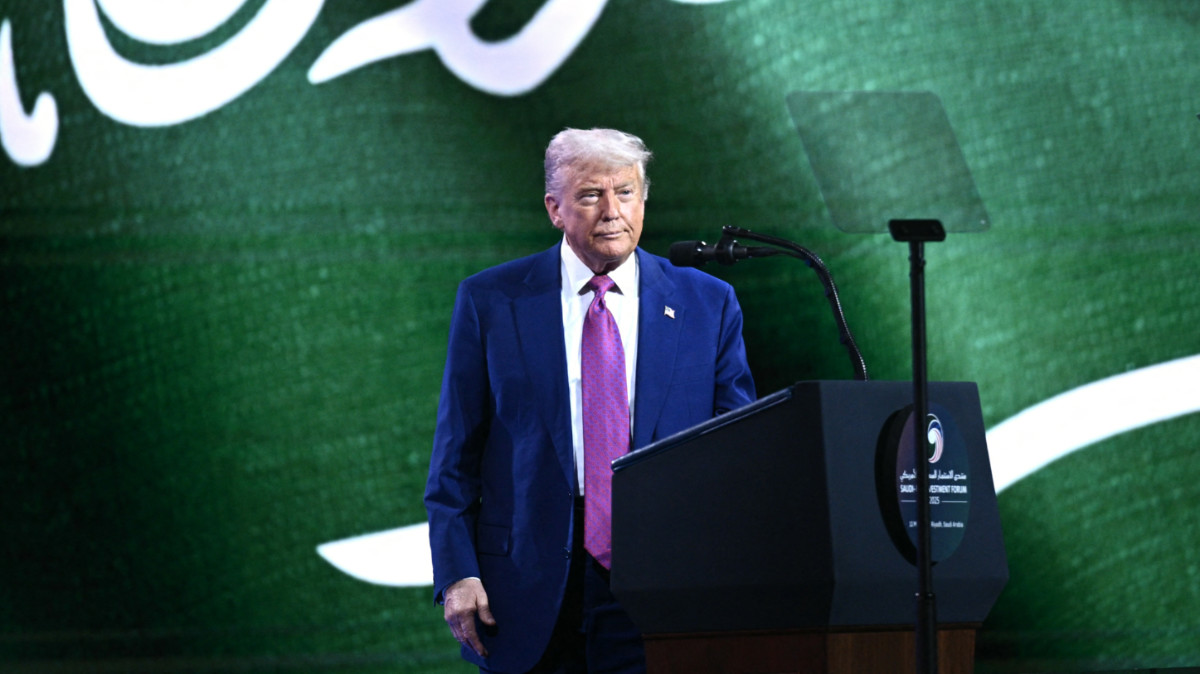Show us something special: Trump announces lifting Syria sanctions

US President Donald Trump announced he was lifting sanctions on Syria on Tuesday, in a sweeping live announcement that underscores how fast the region is reordering itself.
"I will be ordering the cessation of sanctions against Syria in order to give them a chance at greatness," Trump said to applause and a standing ovation during a speech in Saudi Arabia's capital, Riyadh.
"Oh, what I do for the crown prince," he said, referring to Saudi Crown Prince Mohammed bin Salman.
If Trump follows through on his pledge in full, it would mark the first time Syria hasn’t been under US sanctions since 1979, when the US labelled Damascus a state sponsor of terrorism under the government of Hafez al-Assad, father of Bashar al-Assad,
"We are taking them all off," he added, referring to the full raft of sanctions.
“There is a new government that will hopefully succeed," Trump said in his announcement. "I say good luck, Syria. Show us something special.”
New MEE newsletter: Jerusalem Dispatch
Sign up to get the latest insights and analysis on Israel-Palestine, alongside Turkey Unpacked and other MEE newsletters
Syria’s foreign minister said Trump's decision was a "pivotal turning point" for his country.
Foreign Minister Assad al-Shibani said Trump's announcement would allow Syria to "move towards a future of stability, self-sufficiency and genuine reconstruction after years of destructive war".
The announcement is a major win for Syria’s new government, led by President Ahmad al-Sharaa, the former commander of Hayat Tahrir al-Sham or HTS, which toppled Bashar's government from power in December 2024.
Sharaa’s government launched an intense lobbying campaign to obtain sanctions relief as the country copes with wide-scale destruction from a 13-year civil war, staggering levels of poverty and Israeli air strikes.
Trump said he was lobbied by Crown Prince Mohammed bin Salman and Turkish President Recep Tayyip Erdogan to lift the US sanctions.
Blow to Israel?
The move is a blow to Israel, which occupies a swath of southwestern Syria.
Senior Israeli officials have voiced ideas for the country to be carved up into different Kurdish and Druze zones, as they try to bill Israel as a protector of minorities, a position that has been rejected by most of Syria’s Christians and Druze.
Israel also lobbied the US to keep additional troops in northeastern Syria, but the Trump administration rejected the lobbying push, MEE reported previously.
The announcement will likely justify Sharaa’s diplomacy towards the US.
The former rebel commander has said his country does not pose a threat to Israel and suggested he was open to normalising ties if Israel respects a 1974 disengagement agreement.
Sharaa confirmed last week that Israel and his government were engaged in indirect deconfliction talks.
Vindication for Sharaa's diplomacy
Sharaa hosted Republican Congressman and President Donald Trump ally Cory Mills in Damascus last month. He then welcomed Jonathan Bass, a pro-Trump Republican and liquified natural gas executive. After his trip, Bass spoke to several media outlets, saying Sharaa was eager to partner with US businesses and companies.
The Times reported that Sharaa has tried to entice Trump by saying he would welcome a Trump Tower in Damascus. The White House confirmed on Tuesday that Trump will meet Sharaa in Riyadh to say “hello”.
If Trump fully removes the sanctions, it could lead to the historic reconstruction of a country at the centre of the Levant region.
Syria had some business ties with the West in the 1980s and 1990s but was generally cut off from US markets.
Congress passed the Congressional Syria Accountability and Lebanese Sovereignty Restoration Act in 2003, and the following year, former President George W Bush imposed sweeping sanctions.
American exports to Syria were all but prohibited, except for food and basic medicines. Then in 2006, the US banned transactions with the Commercial Bank of Syria.
US sanctions on Syria ramped up massively after Bashar's brutal crackdown on protesters and as the civil war raged. The US slapped sanctions on Syrian businessmen, banks and the government. Bilateral US-Syria trade, which still stood at roughly $900m in 2010, dropped below $60m in 2012.
Trump’s announcement is also high on symbolism.
During his first term, he oversaw the implementation of the 2019 Caesar Syria Civilian Protection Act, which was named after a Syrian military photographer who smuggled tens of thousands of gruesome photos out of the country that documented evidence of war crimes by Bashar's government.
Turkey and oil-rich Gulf states, including the United Arab Emirates, Qatar and Saudi Arabia, could all expand their influence in Syria now, at a time when Iran is in retreat. If reconstruction does get underway in Syria, it could also be a boon to European and American firms. France’s CMA shipping group signed a deal with Syria’s government earlier this month to develop Latakia port.
The UN has estimated the cost of Syria's reconstruction to be at $250bn.
middleeasteye.net